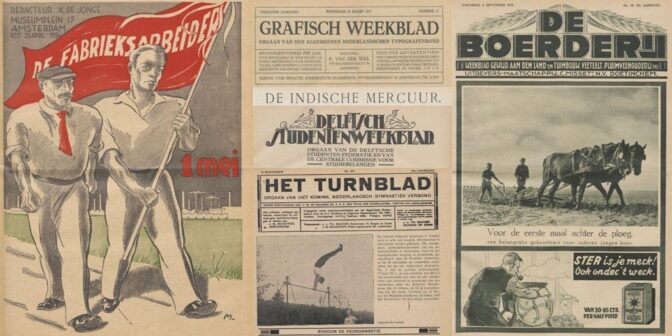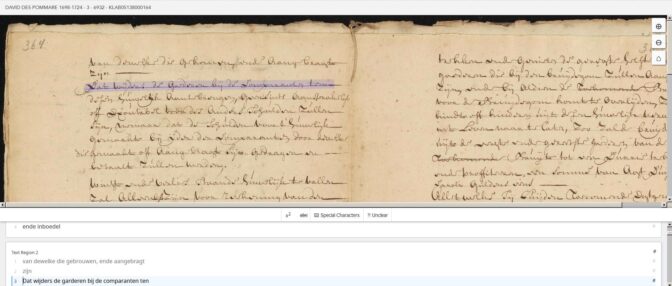Here is an overview of the new sources, projects, and news about archives that were announced last month.
Online sources
- “Time machines” for various towns in Friesland (Leeuwarden, Sneek, Sloten, Balk, Joure) were added to HisGis. This geographical information system allows you to see who owned which properties through time.
- Zelandia Illustrata, a collection of the Royal Zeeland Society of Science, has been digitized and published online. The collection contains maps, prints and drawings of Zeeland. The collection can be viewed in the image bank of the Zeeuws Archief.
- The Zeeuws Archief digitized brewing reports of the “Volharding” brewery, which describe the ingredients and processes used to brew the beer. They are available via the finding aid.
- The ship book of Johannes Hempenius, a secretary of Hindeloopen, was published. It covers the period 1715-1718 and describes the ships that came through Hindeloopen, including their origins, destinations, cargo, and owners. The scans and transcription can be downloaded from the Fryske Akademy website.
- Abstracts of records from the city administration of Utrecht (1122-1577) and the provincial States of Utrecht (1323-1528) were added to the Utrechts Archief website.
- The Brabants Historisch Informatie Centrum published scans of the verdicts of the courts of ‘s-Hertogenbosch and Breda. The scans are linked from the index of criminal records.
- An index of the orphan chamber records of Goes (1603-1811) was published on the Archiefman website (PDF).
- Indexes and scans of death records of Amersfoort were added to the Personen index of the Utrechts Archief.
- The Historisch Centrum Overijssel is digitizing the death duties files (1818-1927) of Overijssel. The first scans have now been put on their website.
- 7,000 letters from the correspondence of statesman Johan de Witt were published.
- 40,000 magazines were added to Delpher.

Websites
- The foundation of Medieval Archives in Amsterdam launched a website to make the medieval records available to a wider audience. For now, the website only contains information about the work of the foundation, not actual records.
- The Brabants Historisch Informatie Centrum launched a website about Catholic boarding schools in Noord-Brabant.
Archives
- Parts of the records of the Amsterdam City Archives will be moved to a different repository in August and September 2019. Scanning on demand won’t be available during that period. Until August, the maximum number of requests per week for free scanning on demand will be 7 instead of the normal 5. Free scanning on demand is available from the finding aids.
- The province of Utrecht joined the Utrechts Archief, which means that the archive will now keep the provincial records as well as the municipal records from Utrecht and the national records relating to Utrecht. [Source: Het Utrechts Archief]
- The Noord-Hollands Archief started a free chat service on Monday afternoon and Wednesday and Friday evening, available from their website. You can chat with a reading room staff member to ask questions about your research.
- Tresoar, the provincial archives in Friesland, acquired the records of World War II resistance fighter Jan de Rapper. [Source: Tresoar]
Projects
- The Utrechts Archief is looking for volunteers to index 30,000 notarial records from Utrecht from the period 1780-1811 at Vele Handen.
- The West-Fries Archief is looking for volunteers to index family cards (1919-1939). They will use the index to determine which records may be published, and which have to remain closed to protect the privacy of living people. See the project announcement for the email address to sign up as volunteer.
- The Netherlands Genealogical Society (NGV) and Open Archives will collaborate to share the NGV collections of prayer cards and family announcements. NGV members will get a 15% discount on an Open Archives lifetime subscription.
- The Resistance Museum was awarded a grant to digitize 900 personal archives from World War II. [Source: Oorlogsbronnen]
- The Amsterdam City Archives is using Transkribus, a tool developed by the Innsbrück University, to teach a computer to read old handwriting. A promising test on records by notary Hendrik Schaef showed a low error rate of 5%. Volunteers can help at Vele Handen to correct the automatic transcriptions, which will be fed back to the computer for training and improvement.

Transkribus example of Amsterdam record


Hi Yvette,
My husband’s family is from Zuid-Holland and his mother was born in Drachten, Friesland. They emigrated to Canada at different times.
We will be travelling to the Netherlands in late August and early September. I’d love to go to the archives in Drachten and Delft to research the families. How do I go about doing this? Do I make appointments?
Any suggestions?
Mona Advocaat